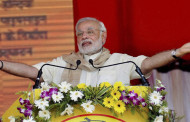The first tranche of 250 tonnes of onions imported by the government has already arrived while the entire consignment of 2,000 tonnes will arrive by the end of this week, which will help boost domestic supplies and check rising retail prices.
In the case of pulses, 3,223 tonnes have already arrived in both Mumbai and Chennai and by October 20, the entire quantity of 5,000 tonnes will reach India.
The Inter Ministerial Committee on Prices and Availability of essential food items reviewed the current prices and availability position of pulses and onions.
During the meeting it was informed that “the first tranche of 250 tonnes of imported onion has already arrived at JNPT, Mumbai, and by the end of the week, the entire quantity of 2,000 tonnes of onion will arrive”, the Food Ministry said in a statement.
It was also observed that wholesale prices of onions have moderated over the fortnight in major mandis.
These consignments are being allocated to states as per their requests, which is expected to help cool prices.
Prices of both pulses and onions rose unabated last month or so due to a fall in domestic production. Barring chana dal, prices of all other pulses have gone up to Rs 150 per kg in most retail markets.
Similarly, retail prices of onion had risen to Rs 70 per kg in Delhi and the same trend prevails in other parts of the country.
Chhattisgarh Chief Minister Raman Singh on Tuesday ordered probe and seizure of self-styled godman Asaram Bapu’s book on sex tips to students.
His book was being taught in some government schools in Kondagaon of Chhattisgarh. There is furore in the state over the book, which is being used to teach the students. The state government had put a ban on using this book in 2012, but the education department in many districts ignored the notice and continued to teach from the book to students in high school and higher secondary school.
As soon as the government came to know about this, it issued a new notice and ordered to take action on the education officers.
A class X girl was allegedly gangraped by her friends on the pretext of taking her to a birthday party at Kopri on September 30 between 2.30pm and 6pm.
The girl was initially not aware of what had happened with her, but when she recollected the incident, she realised that the accused along with his sister and friends forced her to drink alcohol after which she fell unconscious.
The she was beaten up and allegedly raped.
The 15-year-old met the main accused, identified as Kaustub, a year back through one of her school friends. On the day of the incident, Kaustub went to Hiranadani Meadows area, where the victim stays, and asked her to come along with him as it was his birthday and he was treating his friends.
He took the girl near Bharat college in Kopri (west) and later to his home. The accused sister, identified as Dipali, was with one of Kaustub’s friend Mandar, at home.
All the three accused are adults and they were produced in court on Tuesday. They will remain in police custody till October 10.
Investigation officer Sadhan Ingle said, “The accused and victim have been sent for medical test and we are waiting for the reports.”
According to various media reports, leaders from BJP, VHP and RSS are involved in what can be best described as the fight against Love Jihad.
For the uninitiated, the term Love Jihad is used to describe the act of a Muslim man wooing young Hindu girls and then converting them to Islam.
According to India Today, BJP MLA Suresh Rana has admitted that he had fabricated rape charges against Muslim boys to teach them lesson for marrying Hindu girls. A Cobrapost sting suggested that that while the inter-faith marriage was consensual, the Muslim boys were charged with rape to teach them a lesson.
According to a post on Youth Ki Awaaz, Suresh Rana said: “Now I will tell you the truth. We charged them with rape, but it wasn’t rape, it was consensual. We slapped a rape case against them to teach them a lesson. The girl wasn’t ready to give a statement against them. If you look at the case in depth, the girl was willing. Three people didn’t take her away by force… Girls are girls…it has been said about them that they will change according to circumstances in five minutes…when she was slapped and coerced, she wrote the FIR (that we wanted).”What do you think?”
Another BJP leader embroiled in this scandal is current Minister of State for Agriculture Sanjeev Kumar Balyan who was in the news on Tuesday for announcing that labs would set up at ports to check illegal cow-meat export.
Balyan was quoted saying by The Wire: “In the beginning, (Muslim) boys would roam around on motorcycles in front of schools and Plus Two Colleges using Hindu names like Sonu, Monu, with a kalawa (sacred thread) tied around their wrists, pretending to be Hindus. A girl who falls in this trap would come to know only later, after eloping with the boy, that she is not with a Hindu. There have been a lot of such cases.”
Another BJP leader, Sangeet Som who was booked for making inflammatory remarks about the Dadri lynching, explained how they persuade Hindu girls who have married Muslim men to return to their parents: “We make her see the reason that this is not good for her. We tell her that they are Muslims, they never settle for one woman, whereas a Hindu boy will be automatically sent to jail if he does so. Most importantly, we exert on her emotionally that her mother will die, her father will die and brother might even commit suicide as he would not be able to face the society.”
You can check out the whole Cobrapost report here.
The first scene shows her having sex in a car. Bad luck for Indian viewers it was censored. She again meets the same man during her FBI training when the boy greets to introduce she says remember we had had sex last night.
Priyanka Chopra who’s been receiving a lot of applause for her Quantico stint seems to have upped the boldness quotient on the small screen. Why? After enacting a sex scene in the car, Piggy Chops has flaunted her sculpted body as she wore a swimsuit for the upcoming episode of Quantico that will be aired next week.
Priyanka, who’s become the ‘it’ girl even internationally after her TV series started premiering on ABC Network. Flaunting a navy blue swimsuit with a yellow border, Priyanka raises temperature with her perfect body prototype. The episode next week will have Priyanka’s Alex Parrish engaging in a swimming competition.
Priyanka had previously donned the swimsuit in a song from Dostana. Years later, the actress has aced the same, albeit in a different colour for her maiden TV series Quantico. While some of the pictures have PeeCee with her hair tied up, others have Piggy Chops flaunting her long tresses.
All summer long, the streets and bars of Tel Aviv, Israel’s hippest city, have been filled by what may be a bit of an unexpected tune: three women belting out the Yemeni dialect of Arabic with a heavy darbuka beat behind them.
The surprise hit Habib Galbi – performed by a band of three Israeli sisters of Yemeni background named A-WA – managed to rise to the top of this country’s music charts, shattering records and all expectations. The song has also proven a major success abroad, with the music video amassing 1.2 million hits and attracting thousands of fans from across the Middle East.
The song is actually based on a tune that the group’s grandmother – who was born in Ibb, Yemen, but moved to Israel in 1949 – taught them, and for sisters Tair, Liron and Tagel singing it was the most natural thing in the world.
But this summer marks the first time in Israeli history that an Arabic-language song has managed to top the charts, and its positive reception across borders in countries Israel has been at war with for nearly 70 years has many experts wondering if the song is a sign of a cultural thaw and hope amid the increasingly bleak political landscape across the region.
Yemenite music
Born in the tiny desert town of Shaharut in the Arava Valley just north of Eilat, the three Haim sisters that comprise A-WA began singing Yemenite songs from a young age. Tair, the oldest member at 32, told Middle East Eye that at home the family listened to many different kinds of music but that Yemenite music was always present at the weddings, henna celebrations and other parties they grew up attending.
“Yemenite music was something very special for us, something overwhelming. The first time I remember hearing Yemenite music, I was five years old and attending a henna celebration for my uncle. There was a singer on a tin drum, singing with such a unique voice that it caught my ears and I started imitating her.”
From then on, Tair began singing in the Yemenite style, and her younger sisters soon followed suit. The entire family would sit down to watch the weekly Arabic movie shown on Israeli television throughout the 1960s and 70s, and the sisters gradually learned other styles of Arabic music as well.
“We’d put a scarf around our hips and belly dance while watching the movie, imitating the music. We always loved it, and we always felt like it was okay, and even more than okay – that it was a beautiful culture and language,” middle sister Liron, 30, told the Middle East Eye.
Despite the fact that Arabic language and culture has been widely denigrated in Israeli society since its founding in 1948, Liron noted that at home, “the music we grew up with was in both Hebrew and Arabic. Arabic wasn’t something foreign to our ears”.
Habib Galbi is from a genre of songs traditionally sung by women back in Yemen. While the most famous Jewish Yemenite music is Hebrew religious hymns called piyutim, secular music – especially women’s music – is sung in the community’s native Arabic.
Although many singers of Middle Eastern origin in Israel remake traditional songs from the Arab countries they came from, they often translate them into Hebrew, or else pick religious tunes that were originally Hebrew.
But the A-WA sisters explained that they never considered the idea.
“It was natural for us to choose Arabic. It’s more authentic and it felt right … We never even thought of translating the songs. We wanted to preserve them as they are and only give them our own twist,” Liron told MEE.
The sisters’ bet paid off. After releasing their video Habib Galbi, in the spring, it quickly went viral. The group’s debut album, meanwhile, premiers this month. “We are three sisters singing Yemenite music. It is very rare that women from Israel, especially young women, sing this kind of music, because these days you only hear it at private gatherings, and usually performed by older women,” Liron told MEE. “But we take it front of stage and give it a modern twist that opens the ears of many young people as well.”
Arab-Jewish culture’s troubled history in Israel
But while the story may at first seem simple – three sisters reviving their grandmother’s songs – A-WA’s story is wrapped up in the dark history of the suppression of Arabic culture in Israel.
About 50 percent of Israelis are Mizrahim, or Jews who trace their ancestry to the Middle East, compared to the 30 percent who are European-descended Ashkenazim. A large percentage of Mizrahim are Arab Jews, i.e. originally from Arabic-speaking countries like Yemen, Morocco, Iraq, and many others. On top of those, around 20 percent of Israeli citizens are Palestinians, and thus Arabic-speaking as well.
On the surface, the commercial success of an Arabic-language hit seems a given in Israel, considering the fact that a majority of the population is Arabic-speaking or of Arab origin, regardless of religion.
But there is a reason that Habib Galbi is the first chart-topping Arabic song in Israeli history. For decades, Arabic music – and Mizrahi music more broadly – was banned on Israeli radio, in what is seen as part of a larger cultural suppression.
Since the years following Israel’s creation in 1948 that saw the arrival of nearly 700,000 Arab Jews – a result of both voluntary migration as well as persecution in Arab countries that followed the expulsion of Palestinians from their homes in what became Israel – the government largely sought to de-Arabise them and assimilate them into a Eurocentric idea of Hebrew Israeli culture.
This process included the intense stigmatisation of the Arabic language and a process forcing migrants to adopt Hebrew as their home language.
Uri Horesh, an Israeli linguist who studies the relationship between Arabic and Hebrew in modern Israel, told MEE that as a result of the language suppression of that period, “many older Arab Jews in Israel just stopped speaking Arabic, even those who were native speakers.”
Their children, meanwhile, largely avoided the tongue as well, particularly as it became associated with “the enemy”. Historically, Arabic culture might have been the shared heritage of Muslims, Christians and Jews, but with the rise of Zionism and the idea of a distinct “Jewish state,” a dividing line between “Jew” on one side and “Arab” on the other emerged. In this climate, “Arab Jewish” identity became increasingly difficult to maintain, and many first-generation immigrants refused to pass on their language to later generations.
In the 1970s, the Ashkenazi monopoly on Israeli culture was slowly broken as the music of Mizrahim began to enter the public airwaves for the first time after being restricted to private gatherings for decades. But these songs were always in Hebrew – albeit often Arabic-accented Hebrew – and their association with Arabness waned.
Members of the second generation of Israelis slowly began exploring their cultural roots in the Arabic world, and in the late 1980s a few Israeli performers began singing in Arabic occasionally as well. Most famous of these was Ofra Haza, a Yemeni artist who brought to life many old songs that were increasingly being lost with the passing of the first generation and the Israelisation of the second and third.
In the Middle East, but not of the Middle East?
Even as Israel lurched to the right beginning in the 1990s and the occupation and apartheid system against Palestinians became institutionalised and strengthened, Israeli popular culture increasingly gravitated toward Middle Eastern forms.
“There is this anomaly where on the one hand, Israelis recognise that they are in the Middle East, and that at least half of the (Jewish) population originated from the Middle East,” Horesh told MEE. “They recognise that factually. But on the other hand, people say, ‘well actually we’re a Western country; we’re more like Europe.’”
But Horesh pointed out that the success of Habib Galbi points to a darker truth regarding racism in Israeli society. While the idea of Mizrahim embracing their historic cultures is increasing, this does not point to an atmosphere of increased tolerance.
“There has been shift among Jews. While the Ashkenazi elite back in the 1950s or 60s looked down on people of Mizrahi descent … these days it is very much taboo to say anything racist against any Jew,” Horesh said.
“There is of course racism on the streets, but in public discourse you don’t encounter it and it is very much condemned. This is, of course, unlike racism against Palestinians, Muslims or any non-Jew. But it’s okay to be prejudiced against Palestinians in Israeli society.” ”
Associating anything within the broad spectrum of Jewish culture as being Arab is frowned upon, especially now when it’s okay again to be racist against Arabs,” he added.
Bleak economic realities facing Mizrahim
Smadar Lavie, a Mizrahi feminist activist and scholar based at the University of California, Berkeley, told MEE that she had “mixed feelings” regarding the current boom in Mizrahi culture and the interest from the historically Ashkenazi mainstream.
“In Israel’s public sphere there has been a complete disappearance of any attempt to talk about any peaceful solution to the Palestine-Israel conflict. The Jewish everyday is lived through a complete denial of what goes on in the West Bank and Gaza. At the same time, however, there is a renaissance of Judeo-Arabic culture among Mizrahim, after decades of suppression by the Ashkenazi ruling hegemony. Paradoxically, this Arab renaissance goes hand in hand with the Mizrahi majority vote for ultra-nationalist parties,” she told MEE.
While the use of Arabic by Mizrahim might appear to be a kind of cultural “resistance” after decades of Ashkenazi hegemony and discrimination in Israel, Lavie argued that the phenomenon “actually deepens the Mizrahi-Ashkenazi status quo with regard to control over governance, while simultaneously having the Zionist project of obtaining further control over maximum land with minimum non-Jews on it progress without any interruptions.”
She argued that the emphasis on Arab culture devoid of Arab politics functions as a “numbing mechanism,” as Israel’s constant wars against Palestinians enlist Mizrahim against the Palestinians and thus discourages them from fighting intra-Jewish racism.
Culture, on the other hand, “is safe and successful as long as it does not touch on Israel’s relations with its Arab neighbours.” This allows Israel to claim itself as tolerant and multi-cultural while at the same obscuring the realities of its political policies, she argued.
While she said she was pleased Mizrahi culture had penetrated the “bastions” of elite Ashkenazi culture in Israel, “in the end, this does not lead to any improvement in the daily lives of Israel’s Mizrahi majority. Israel’s neoliberalism mostly benefits the Ashkenazi industrial and managerial elites. The class gap is widening, and achieving residential and nutritional stability is getting harder and harder for many Mizrahi households. Poetics or Arabic pop tunes sung by Mizrahim do not remedy such problems,” she added.
Beside cultural suppression, Mizrahim have been relegated to the lowest rung of Israeli Jewish society since they arrived in Israel, when they were forced to live in development towns in the peripheries or urban ghettos and denied access to jobs and education.
Even today, Mizrahim are five times as likely to be unemployed as Ashkenazim and around half as likely to attend university, and in general the average incomes of Mizrahi Jews are around one-third less than their Ashkenazi counterparts. For Lavie, these economic realities – and the six decades of institutionalised racism they reflect – overshadow any talk of a “Mizrahi renaissance” that the success of songs like Habib Galbi have inspired.
Despite politics, cultural connections persist
But while the reasons for pessimism are clear, not everyone is ready to give up hope.
Ted Swedenburg, an anthropologist at the University of Arkansas who has studied the relationship of Israeli music to the Arab world, told MEE that he considered the song’s success “exciting”. He said that A-WA’s rise points to the fact that “despite 70 years of terrible politics and violence,” cultural connections between Israel’s Mizrahim and the Arab world persist.
“On the other hand,” he cautioned, if the politics don’t change, then it won’t go any farther. We shouldn’t overestimate the hope that (the song) gives us.”
Strangely, much of the media hype regarding the band has focused on the fact that an “Israeli” band has scored success in the “Arab world,” even going so far as to suggest that young Arabs are warming up to Israel. But the realities of this Arabic-singing Yemeni trio are much more complex, as the history of Mizrahi artistic production in Israel shows.
However, for the Haim sisters that comprise A-WA, their success around the world has been a blessing that allows them to connect to a wider world from which most Israelis remain closed off. “People who see us online and like us often don’t even know where we come from. Some people from Baluchistan have even contacted us, asking if we’re Baluchi because we wear Baluchi scarves in the video,” Tair told MEE.
“People ask us: Are we from Yemen? From Israel? We love the mystery around it, because the music becomes the focus, and we think that’s better. We’re all people and we all eventually want the same things. Music is clean from politics. It’s a common ground, and that’s the beauty of it.”
Patna: A recent survey has indicated that the BJP-led NDA will get 147 seats in the upcoming Bihar Assembly Elections, whereas the grand alliance will bag 64 seats.
As per a survey by Zee Media Group, 53.8 percent of the people feel that the next government will be that of the NDA and 40.2 percent of the people said that the grand alliance would come to power.
Jitan Ram Manjhi’s HAM, Ram Vilas Paswan’s Lok Janshakti party (LJP) and Union minister Upendra Kushwaha’s
Rashtriya Lok Samata Party (RLSP) have joined hands with BJP as part of the National Democratic Alliance.
The grand alliance comprises of Rashtriya Janata Dal (RJD), Janata Dal (United), Congress and Janata Dal (Secular).
As for the trend regarding areas affected by Naxalism, 54.6 percent said that NDA will win and 39.7 percent said that the grand alliance would romp home.
When asked by the politically powerful Yadav community as to which party stands where, 43.7 percent said that NDA would win but more than fifty percent (50.2 percent) said that the grand alliance would be the victors.
Coming to the female population, 58.1 percent of women said that BJP-led NDA would come to power, whereas 35.2 percent said that they want grand alliance to form the next government.
The survey was also done on the basis of caste and religion.
35.9 percent of Muslims preferred the NDA, while a majority of 57.9 percent opted for the grand alliance.
As for the Hindus of Bihar, 57.4 percent preferred the NDA and 36.6 percent preferred the grand alliance.
The survey was done between 29 and 30 September, 2015.
Polls to the 243-seat Assembly is to be held on October 12, 16, 28, November 1 and 5.
The counting of votes is scheduled for November 08.
Aligarh Muslim University Vice-Chancellor Lt Gen (retd) Zameeruddin Shah has reportedly asked Muslims to look at how they treat their women. Speaking at a felicitation function of AMU Old Boys at Lucknow on Sunday, Shah was quoted as saying Muslims lagged behind in the development race because they enslaved their women.
According to The Indian Express, Shah said, “You have not utilised half of your population. Women remained enslaved. They remained inside home. Muslims have no one else to blame. You enslaved women and the result is you are enslaved. I stayed in Saudi Arabia, the situation remains the same. Women are confined. Except Turkey and Iran, women remained enslaved in all Muslim world. That is the reason they are backward.”
These remarks come just a few months after Shah did not allow undergraduates girls to use library of AMU stating it would attract boys.
He also lashed out at Muslims for their work ethic. According to the report, he said, “Muslims work for 11 months in a year. During Ramazan they do not work. Also, in any normal week, they do not work for two-and-a-half days. On Friday, they make preparations for Namaaz. This is followed by the weekend.”
The visitors were wasteful with their opportunities and were made to pay dearly with Sanli leading the charge for Platt’s side.
David Platt’s sojourn in the Indian Super League (ISL) with Deccan side FC Pune City began with a 3-1 win over Nicolas Anelka’s Mumbai City FC. Tuncay Sanli (12′) opened the scoring before Frederic Piquionne (34′) levelled proceedings. Sanli (56′) got his second after the break which was followed by a third for the hosts courtesy of Israil Gurung (68′).
The English coach sprung a few surprises by electing to field a 4-5-1 formation without some of his Indian stalwarts who are away on international duty. Steve Simonsen started in goal, whilst Gouramangi Singh and Diego Colotto began in central defense. The veritable Nicky Shorey began on the left wing.
The attack, bereft of Adrian Mutu, on the bench for the start of the campaign, was led by Tuncay Sanli alongside Israil Gurung and Maithani on the wings.
Anelka started Ashutosh Mehta, Pavel Cmovs , Juan Aguilera and Keegan Pereira started in defence with the goalkeeper on the night being Albino Gomes. Sony Norde helmed the attack while accompanied by Andre Moritz and Fredrick Piquionne.
Good work by Piquione down the right early on in the game saw him cut a ball across for Gabriel Fernandes in the middle. The Goan midfielder however could do no better than warm the keeper’s gloves with a shot straight at him.
Sanli popped up with the goal to settle Pune City down in the 11th minute. A dominant Mumbai dozed off at the back and allowed Gurung too much space. The winger delivered the ball to the back post where Sanli made no mistake with the header.
Mumbai sought an immediate reply and nearly had one. Norde effortlessly shanked past his defender and was clear down the left side of the box. However, instead of passing to his teammate who was unmarked, he opted to shoot and only managed to have his effort blocked.
Norde was a handful and the Haitian repeatedly kept fizzing shots from outside the box towards goal, one which was particularly difficult for Simonsen to handle.
Fernandes was causing all sorts of problems for Gurjinder and the Goan once again managed to wriggle himself free of the defender’s grasp. His ball in was acute, but Diego Colotto somehow managed to get back in time.
A great run down the right by Gabriel was followed by a cross that found itself all the way to Norde at the far post. The attacker, with an empty net to aim at, managed to crash his shot against the post.
However, Mumbai maintained possession and Ashutosh delivered a sublime cross onto head of Fredrick Piquione who finished into the bottom corner as Anelka’s men drew level.
Chances were coming fast for the Blues, with Gabriel blasting a great counter wide and Juan Aguilera soon missed an opportunity to head Mumbai into the lead as Ashutosh Mehta’s dink to the Spaniard was hit straight to an alert Simonsen.
A superb cross into the box saw Piquine grapple for it, inadvertently setting up Norde for a shot he should’ve had on target, yet the Mohun Bagan forward blasted it over and the teams went into the break level at 1-1.
Yendrick Ruiz was brought on at the start of the second half in place of James Bailey.
Moritz then had a great chance to double Mumbai’s lead but he blasted the ball wide. He would go onto regret it as the Orange and Purples scored again.
It was the Gurung-Sanli combination for a second time as a sumptuous cross from the right found its way to the far post where the forward headed in again.
On the hour mark, goal scorer Sanli was withdrawn for marquee player Mutu. Minutes later, Moritz who looked to have a match he was likely to forget, was replaced by Selim Benachour .
Norde wasted a free-kick with a poor delivery which was won by Mehta down the right.
A fairly speculative cross by Gurung in the 68th minute took a massive deflection off Juan Aguilera and the ball looped past the outstretched hands of Gomes to plonk itself in the corner of the net to give Pune a 3-1 lead.
A last-ditch interception by the captain on the night for Mumbai City, Bertin, certainly prevented the score-line from getting embarrassing for the away side as Ruiz was on hand to convert.
The team from the commercial capital then threw on Nicolas Anelka as a last resort.
The 8734 strong crowd were stunned however when Lenny Rodrigues limped off with a suspected hamstring injury. Sushanth Mathew, a former Blaster took his place. Anelka was dropping deep as his side sought a way back intpo the game, but the creative had evaporated. Mumbai gained a series of corners as the referee indicated four minutes. Gurung too went down with suspected cramps as he had to be stretchered off.
The game however was closed down effectively by Pune City as the home team recorded their second straight Maha Derby victory.
This is Akshay Kumar’s fourth release already in the year and after a successful Baby, an average Gabbar is Back and a below average Brothers, Akshay is back in the game with Singh is Bliing. The film which released on Friday has been raking in huge moolah at the box office as well.
After a stupendous opening of Rs 20.67 crore on its first day, SIB collected around Rs 14.50 crore on Saturday, taking its two day domestic total to a whopping Rs 35.17 crore. Now the film definitely faced a huge drop on its second day but it was already a given, knowing that Friday was a national holiday. But it witnessed a sharp growth on Sunday and netted in a little over Rs 19 crore. Now with Rs 54.44 crore in its kitty in merely three days, Akshay’s Singh is Bliing has already created many box office records.
Best opening for Akshay in 2015!
Akshay has had four films already. Brothers topped the list with around Rs 15 crore opening, thanks to Independence Day holiday. Gabbar is Back opened to Rs 13 crore and Baby had a little over Rs 9 crore chipping in on its first day. By far, SIB has turned out to be Akshay’s biggest opener of the year so far.
Highest opener for any Akshay Kumar film ever!
High on recall value (it’s prequel was super successful) and star power, Singh is Bliing had an excellent occupancy on its first day. Not just that, advance bookings which started few days prior to its release had already helped trade experts predict a bombastic opening for the film. And so it happened. SIB opened to an over Rs 20 crore mark, which is by far the highest for any Akshay starrer. His previous best was Brothers which opened at Rs 15.25 crore which beat Rowdy Rathore (Rs 15.10 crore) by a whisker.
Highest opening for any Prabhu Dheva film
Prabhu Dheva who’s been the toast of masala films ever since he forayed into filmmaking in Bollywood with Salman Khan’s Wanted. He almost made a demi-god out of our Bhaijaan who went on to become synonymous with the kind of films Prabhu’s known to make. Then, he created ripples with a huge blokbuster like Rowdy Rathore. And as we said, Singh is Bliing has smashed the RR record by miles.
Second highest opener of 2015!
After Bajrangi Bhaijaan created a storm at the box office and went on to become the biggest opener of the year, Akshay’s Brothers turned out to be the second highest opener of 2015. And now that SIB has beaten Akshay’s previous record, it has also turned out to be the second highest opener of the year.
Second highest collections on any holiday in 2015
With over Rs 20 crore in its kitty on Friday, the film has also managed to record the second highest collections for any film on a holiday. Bajrangi Bhaijaan had a Rs 27 crore opening on Eid, which stands tall on top of the list but Akshay just displaced his own film Brothers from the second spot. Thanks to SIB’s towering collections on Gandhi Jayanti.
Second highest opening weekend of 2015!
Bajrangi Bhaijaan had smashed all pre-existing records with a humongous Rs 102 crore show in the first three days. While the second highest opening weekend belonged to Akshay’s last release Brothers (Rs 52.08 crore) followed by John Abraham’s Welcome Back (Rs 51 crore), with Rs 54 crore in its pocket, SIB has recorded the second highest opening weekend for the year.
Highest opening weekend for any Akshay Kumar film
SIB is also emerging as Akshay’s biggest bet till date. Why? After it turned out to be Akshay’s biggest opener till date, the huge collections in the first three days itself has catapulted the film to record the highest opening weekend for the actor.
Consecutive 50 crore weekends for Akshay!
Akshay Kumar’s Brothers recorded an opening weekend of Rs 52.08 crore which was his previous best until SIB recorded a Rs 54.44 crore weekend this time, thereby beating his earlier record. Both the films released back to back, hence Akshay had two consecutive films with above Rs 50 crore opening weekend.
Second highest Sunday collection for 2015!
Singh is Bliing collected around Rs 19 crore on its first Sunday, which is also the second highest by any film this year. It was Salman’s Bajrangi Bhaijaan which got around Rs 38 crore, which stands as the highest collections for any film on its first Sunday ever.
















Recent Comments